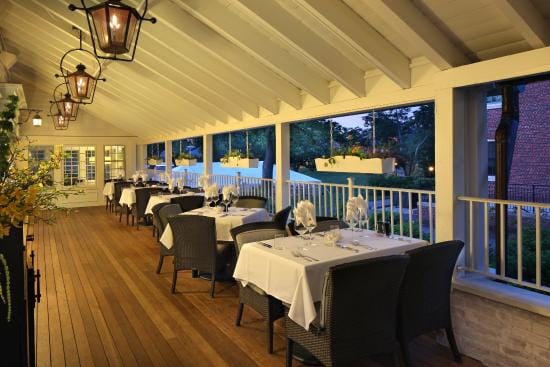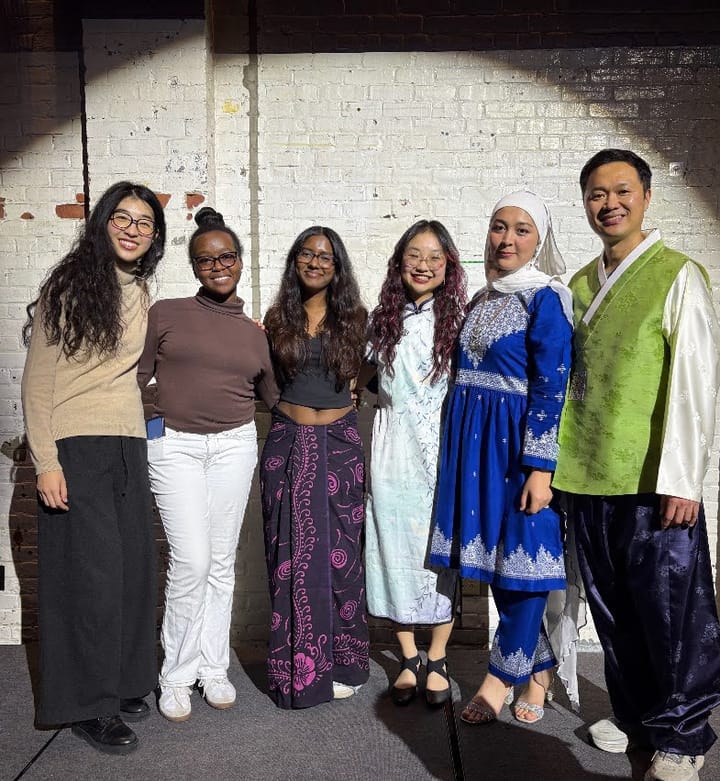“The Bear” Reminds Me of My Outrage as an Amherst Student
“The Bear” has captivated viewers with a grounded, gritty depiction of kitchen work. Mase Peterson ’23E uses the show to reflect on their experiences in food service and their perspective as a student with marginalized identities.

This past summer, dejected by an uneventful and unpaid internship, I got another job as a food runner at the local 30Boltwood Restaurant in hopes of saving my bank account from near-total hemorrhage. For us first-gen, low-income (FLI) students, this type of employment is an all-too-familiar consequence of trying to live in a society that’s engineered by worker exploitation but also a reliable failsafe in times of financial distress (unless, of course, it’s a pandemic shutdown). You’re stuck between gas money for your trip to therapy or your last non-Val meal for the whole month? Time to put that apron back on, babes.
During my initial few weeks of training at 30B (an in-house moniker), I just so happened to also catch FX’s “The Bear” on Hulu. A summer blockbuster, both for critics and audiences, the eight-episode series has a 100% score on Rotten Tomatoes, and for pretty good reason. The Chicago-based dramedy boasts a well-written, expertly-performed, and poignantly detailed exploration of life in a struggling kitchen. If you know the show, you might think this was exactly the type of content I would want to avoid when already tasked with bringing persnickety WASP moms their $12 salads but I haven’t stopped thinking about the show since then.
The story follows a young, withdrawn chef named Carmy (played by Jeremy Allen White) who leaves his prestigious title in fine dining to salvage his dead brother’s rundown beef shop, all while confronting the painful history behind the transition. And like other ensemble-based shows (“Orange is the New Black”, “Shameless”), “The Bear” leverages the main character’s arc like a springboard, boosting the visibility and interior volume of other characters.
In fact, I’d argue Carmy’s narrative presence has more to do with how he interacts with and isolates himself from those around him. Playing the new but persistent sous chef Sydney Adamu, Ayo Edeberi is Carmy’s most compelling accomplice within the narrative. She represents Sydney’s own journey through a protean performance that often juxtaposes and even supersedes White’s (taking note of Edeberi’s chops as a comedian, there seems to be no end to her versatility).
And the fact that she’s another brilliant Black woman forced to clean up the white men’s mess is also salient to the story. Case-in-point: her fights with Carmy and his cousin, Richie “Messy, Pseudo-Italian Daddy” Jerimovich (played by Ebon Moss-Bachrach, an Amherst native). Moss-Bachrach showcases his tremendous conviction to play the ultra-sensitive jackass but one who you just can’t help but care for despite all his antics. Other characters like the funny and defiant Tina, the only other woman in our dysfunctional brigade de cuisine, and the earnest and heartwarming Marcus (Lionel Boyce) do not nearly get as much exploration as they should despite their singular and accumulative impact on viewers like myself.
Beyond the characters, perhaps the show’s storytelling excels most in its heavy but not overcooked blend of atmosphere, mood, and setting. If you’ve ever been in the bizarre predicament, by choice or otherwise, to work in this type of environment, you'll immediately notice some eerie parallels. If your sweat has flavored the burger juice, your tired feet have throbbed against the sticky floor, and you’ve seen the politics that ranged from Absolute Managerial Autocracy to Don’t-Even-Have-Time-to-Cry-in-the-Walk-In-Freezer Mayhem, you might intimately know the horror that “The Bear” is serving. It’s all there in the endless whirring of the receipt printer, the ritualistic and often agitated cues (“Behind!, Corner!”), and how Carmy’s crew fight for their lives during brunch — a notoriously undertipped shift — as non-diegetic electric guitars scratch against the walls of Beefland.
Many of these intense depictions in Carmy's kitchen resonate with my own history in food service. Yet when I think back to my viewing experience, what I found to be even more upsetting — and frankly, demoralizing — within the clusterfuck parade of “The Bear” is the traumatically vulnerable positions of its working-class characters. They reminded me of myself and many others here at Amherst, who simultaneously occupy two worlds: that of the privileged student studying at a highly selective, extremely wealthy private school and that of a poor person working two jobs just to make ends meet before graduation.
Carmy’s position is the case study that mirrors this condition. His world-class abilities as a Michelin-trained chef do not overpower a system against him. His passion and commitment cannot save him from a life burdened with debt and family tragedy. So much so, the very thing he loves becomes the object of his pathology. It’s a crisis that is classed, raced, and gendered (Sophie Gilbert’s article in the Atlantic hints at a crisis of masculinity in the show. But it’s, in fact, a crisis of cis white masculinity). But it’s also due to his incapacity to accept those tensions inside of himself and integrate them into a stable identity. He can only dissociate in the surrounding turbulence and keep chopping at his mixed vegetables before the caged beast slowly rattles the knife again.
I too find myself neglecting to accept that my own tensions — a queer Southerner in New England, an Amherst FLI student, a perfectionist with ADHD and OCD — can survive and thrive here. Among many other trinkets, what Amherst often tries to sell us is the illusion of safety. A sliver of this facade shattered with our recent false active shooter alert. The fact is: vulnerable and marginalized people (though not a monolith), have always known that this message just isn’t true. I know this not just because of my own lived experiences but those of my friends, loved ones, and community members. The friend receiving disability checks for crippling mental illness; the friend escaping a domestic violence situation with a baby and no assets; the friend who’s giving blowjobs to rich assholes on the weekends so that he can buy a car and pay for course books; the peer who discusses Tolstoy with you by day and serves cat-fish to you by night, wondering if knowing how to talk about Tolstoy could ever fix their distorted sense of worth.
The illusion of safety, as many writers and scholars have stated before me, is lethal and only functions for those who have never been vulnerable. And the irony is that it is the most vulnerable who have no choice but to feed the most privileged that same lie by virtue of their time, energy, and labor in the kitchen — here at school and beyond. When I think about this reality and my outrage as a student at Amherst, I experience the institution as a depersonalizing simulation of sorts. Nothing feels real and yet the precarious urgency to play the role of “student” persists. And there’s a moment, before the reality of my situation sinks in again, where I become suspended. I wonder: What if I stay here, paused in the fever of everything? And then the thought evolves: What if I just completely stopped? It’s a moment that reminds me of a scene in episode 5, where Carmy comforts a disheartened Marcus after he blows a fuse in the restaurant. Carmy, in a moment of empathy, admits that he once started a fryer fire the night after he won Food & Wine’s Best New Chef. He reflects out loud: “You have this minute where you’re watching the fire and you’re thinking, ‘If I don’t do anything, this place will burn down and all my anxiety will go away with it.’” Marcus replies, “And then you put the fire out”, and Carmy reaffirms: “And then you put the fire out.”
For the 40 percent of Amherst students paying full tuition who don’t know, the service industry for FLI students is like your rich grandfather, the semi-functioning alcoholic and Howard Schultz apologist, the one who you FaceTime every so often so that you don’t feel so bad for your primarily transactional relationship: You wanna avoid it but there’s really no choice. This isn’t a polemical generalization about what wealthier people do with their time here in the Granola Valley — it’s a meaningfully understated tension, regularly filtered out through the college’s capitalist recital of respectability. Let’s talk about our generous financial aid policies but not the fact that an institution worth nearly $4 billion still pays a barely livable wage to its overworked dining hall staff, many of them people of color. In Hampshire County, that would be about $18/hr minimum for an adult with zero children. Remember to thank Pro-Life Shadowlord Andrew Nussbaum for your Giant Purple Mammoth Balloon but maybe don’t mention the Valley’s housing shortage or the rampant mental health crises among students. Just do a land acknowledgment here, form another task force there. #ProtecttheHerd. You know the drill. Now dig in.





Comments ()